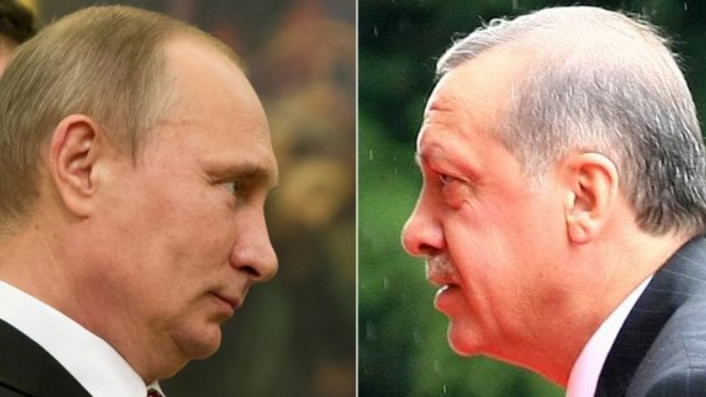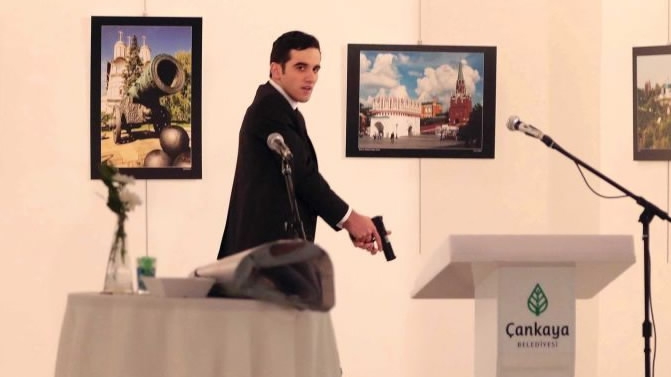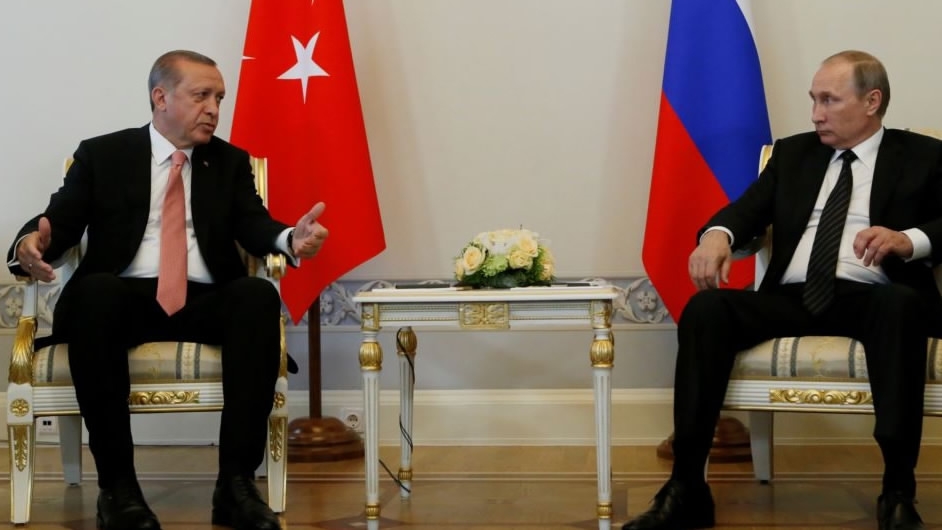
Politics
22:57, 19-Dec-2017
Russia, Turkey prefer 'hand in hand approach'
CGTN

“Don’t forget Aleppo! Don’t forget Syria!”, the relationship between Russia and Turkey were faced with bleeding test in 2016, with the slogan being shouted and the Russian ambassador Andrey Karlov being murdered in Turkey.
In 2015, a Turkish Air Force F-16 fighter jet shot down a Russian Sukhoi Su-24M attack aircraft near the Syria–Turkey border. Then President Putin on 28 November signed a decree calling for the ban or limit on imports from Turkey, the work of Turkish companies in Russia and any Turkish nationals working on Russian businesses.
The interactions between Turkey and Russia were frequent in recent years, including negative and positive ones, especially on Syria issues. Through the tests of forgiveness and apologies, the two nations seem to prefer hand in hand approach in the future.
Any scars after the assassination?

The gunman was identified as Mevlut Mert Altintas, a member of Ankara's riot police squad. /AP Photo
The gunman was identified as Mevlut Mert Altintas, a member of Ankara's riot police squad. /AP Photo
The murder followed days of protests in Turkey over Russia’s role in Syria as a backer of President Bashar al-Assad and came on the eve of talks in Moscow about the future of Syria involving Russia, Iran and Turkey.
Andrey Karlov, 62, was several minutes into a speech at an embassy-sponsored photo exhibition when a man who stood directly behind him in a dark suit shot the diplomat multiple times in the back from close range.
The assailant was a 22-year-old off-duty police officer who worked in Turkey's capital and the assassination was to disrupt newly re-established relations between Turkey and Russia, reported by various media outlets.
"On behalf of my country and my people I once again extend my condolences to Russian President Vladimir Putin and the friendly Russian people," said Recep Tayyip Erdogan, President of Turkey.
"The crime that has been committed is undoubtedly a provocation aimed at derailing the ties between Russia and Turkey, as well as the peace process in Syria," said Putin, President of Russia.
Russian foreign ministry spokeswoman Maria Zakharova said, "We qualify what happened as a terrorist act. The murderers will be punished."
The purpose to alienate Ankara and Moscow, however, failed, and the murdering incident seemed to energize the cooperation fighting against terrorism, instead of damaging bilateral relations.
Ups and downs

Russia-Turkey relationship on Syria issue
The latest news about Russia and Turkey is a deal struck by Russian and US leaders on settling the crisis in Syria in November, which is a blow to Turkey. The deal forces Ankara to overhaul its position about how to navigate the Arab country out of a war that has raged on for years.
The US-Russian joint statement created the impression that Turkey has been left out of the game in Syria, observed Cahit Armagan Dilek, director of the Ankara-based 21st Century Turkey Institute said to Xinhua.
The joint statement goes counter to Ankara's plan to move militarily against Kurdish militia in Syria's Afrin, exclude them from the peace process and eliminate Syrian President Bashar al-Assad as illegitimate.
Turkish President Recep Tayyip Erdogan on Monday expressed his dissatisfaction with the joint statement which excludes military option, except against the ISIL, in the resolution of the Syrian conflict.

Turkish President Recep Tayyip Erdogan speaks to Russian President Vladimir Putin (R) during their meeting in St. Petersburg, Russia, August 9, 2016. /Reuters Photo
Turkish President Recep Tayyip Erdogan speaks to Russian President Vladimir Putin (R) during their meeting in St. Petersburg, Russia, August 9, 2016. /Reuters Photo
"If a military solution is out of the question, then they should pull their troops out," he told the press in Istanbul before leaving for Russia to meet with President Vladimir Putin.
"Russia, once a significant actor in Middle Eastern politics, has in recent years returned to the region as a game-setter," said Professor Nursin Atesoglu Guuney, the dean and head of the International Relations Department at Bahcesehir Cyprus University.
She noted that despite difficulties, Turkey’s continuing relations with Western institutions like the EU strengthen its hands in its ties with Russia and other regional powers.
(With inputs from Xinhua )

SITEMAP
Copyright © 2018 CGTN. Beijing ICP prepared NO.16065310-3
Copyright © 2018 CGTN. Beijing ICP prepared NO.16065310-3